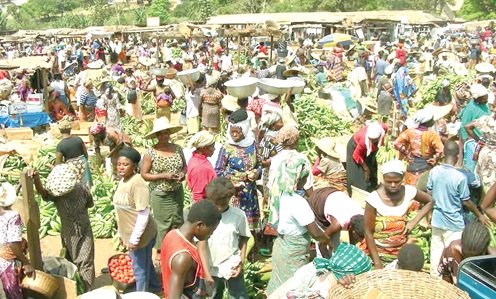Welcome to Techiman, one of the ancient, famous and busiest towns in the middle part of the country.
The town has the biggest market or trading post in the West Africa sub-region.
Before Techiman became the Bono East Regional capital in 2019, the town was already popular because of the existence of the Techiman Market, although the selection of the town as the capital of the newly created region has also added to the status of the market.
Commercial city
The Techiman central business area is a commercial centre where people conduct all sorts of brisk activities from morning to deep in night.
![]()
Techiman is strategically located along the Kumasi–Tamale Highway
Here, people stay awake until very late, whether during the week or at the weekends, as trading activities, the playing of traditional games, the pushing of wheelbarrows full of goods and wayside food vending continue unabated.
When the Daily Graphic visited the town recently at 10:20 p.m., people were seen queuing for food, while taxi cabs, tricycles referred to as "Pragya", and other commercial buses and mini buses continued their brisk business of picking and loading, dropping and off-loading their passengers and goods.
The various drinking pubs were also in business, with some patrons sitting on the shoulders of the road to eat, drink and chat.
Natural crossroad
Strategically located along the Kumasi–Tamale Highway, Techiman is a natural crossroad in the country.
Every traveller heading north from the Greater Accra, Ashanti, Central, Western, Western North and nearby Bono and Ahafo regions must pass through this vibrant town.
Beyond the country’s borders, traders and travellers from Burkina Faso, Togo and Nigeria weave through Techiman, boosting commerce.
History
History has it that the popular Techiman market was established by the late Paramount Chief of the Techiman Traditional Area, Oseadeeyo Akumfi Ameyaw I, in 1944.
He was said to be a trader who transacted his business in the northern part of the country and Ghana’s neighbouring countries, such as Burkina Faso, Togo and Nigeria.
On how the market came into being, the Registrar of the Techiman Traditional Area, Evans Eagan, said that as a traditional ruler who was interested in trading activities, Oseadeeyo Ameyaw decided to start operating in Techiman by establishing a mini market at the forecourt of the palace.
Mr Eagan said before then, there was no market in the area for residents to obtain their basic needs from.
"During that period, people only purchased products, including food items, from traders, predominantly women, who carried them from house to house every morning and evening," he said.
Mr Eagan said to solve the challenge and frustrations, Oseadeeyo Ameyaw established a small market beside his palace, urging the public to bring items to sell or purchase.
Unsold goods
As a visionary leader who was passionate about the sustainability of the market, Oseadeeyo Ameyaw decided to purchase all unsold goods, especially food items brought to the market by the traders, which he distributed freely to residents, particularly the vulnerable in the area.
With such assurance that whatever was brought to the market would not go to waste or be sent home, hundreds of people started patronising the market centre.
In the 1970s, the market became an important three-day wholesale market in the West African sub-region.
Techiman never sleeps
Food vendors, drivers and traders who spoke to the Daily Graphic said "Techiman never sleeps".
A food vendor, Felicia Akosua, told the Daily Graphic that she operates beyond midnight every day and at weekends.
The vendor, who was busy serving hot meals to hungry night traders and travellers, said weekends were very busy times for her.
A taxi driver, Paul Amoakohene, who compared the town’s central business area to Accra’s Circle, said all sorts of brisk activities go on in the night.
"Here, we trade more than we rest. Techiman is a crime-free town," he said.
Writer's email: biiya.ali@graphic.com.gh

